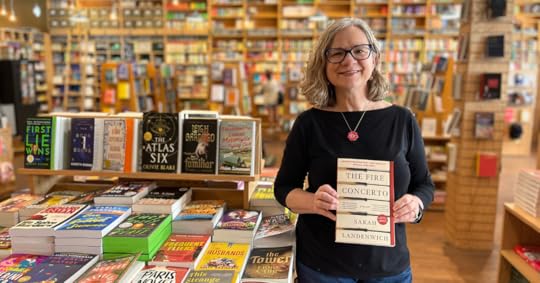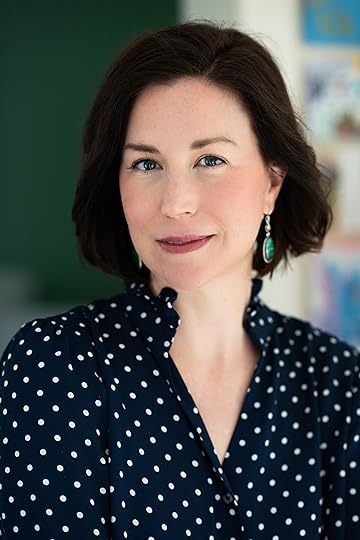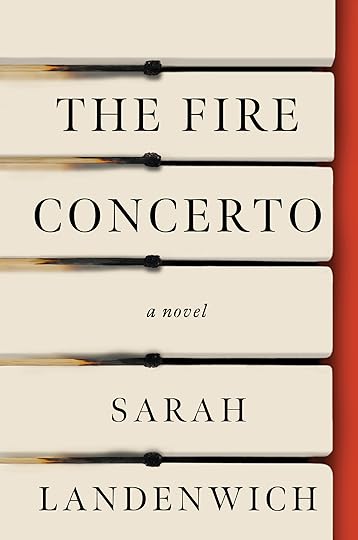The Music Marches On: An Interview with Sarah Landenwich

Sarah Landenwich’s debut novel, The Fire Concerto, is the story of a woman who has turned her back on her dreams who decides to step out of the shadows to ensure a brilliant female musician lost to history is not forgotten. When I first heard about Sarah’s novel, I wanted to read it immediately! The story takes readers on a journey of forgiveness, of oneself and others, and the pursuit of second chances. Thank you to Sarah for talking with me about this fabulous novel.
— Rae Ann Parker, Parnassus Books
 Sarah Landenwich
Sarah LandenwichRae Ann Parker: The Fire Concerto begins with this line, “The invitation arrived on a Friday, care of The Andromeda Club.” This sets the stage for your story about classical musicians, set mostly in a dive bar in Austin, Texas. When did the story first come to you, and how did you choose this setting?
Sarah Landenwich: The initial spark for this novel arrived one night several years ago while driving down a dark highway in Colorado. I was traveling down the empty road, and the idea literally flashed into my mind: three female pianists, one in the nineteenth century, one in the early twentieth, and one in modern times, connected by their pedagogical lineage—a line of shared teachers. That was all. I was working on another novel at the time and didn’t pursue the idea for years, but it was there, percolating in the background.
I’m a classically-trained pianist. I was very serious about music as a young person. My favorite musical period is the Romantic era. This is the time of Chopin, Liszt, Brahms, the Schumanns, etc. When I started thinking more concretely about the book that would become The Fire Concerto, it was my experience with the music that helped me conceive of the nineteenth-century storyline, which was the part of the novel that came to me first. I’ve spent enough time sitting at a piano playing the music of that period to feel like I’ve ventured into a few nineteenth-century parlors. It was easy to imagine my characters sitting at a different piano a hundred and fifty years ago playing those same pieces, feeling similarly moved by them. Of course I also did a load of research into actual musical figures of that era. But ultimately, the music was the conduit.
My present-day protagonist came later. I knew I wanted my character to have been a prodigy who stopped playing because of an injury to her hand, but I didn’t know yet who she was or what the injury was from. Injury or chronic illness is something most people carry privately. You can’t see migraines or back pain or PTSD from the outside. But I thought how much more friction my character would have on the page if her injuries—and therefore her past and her trauma—were visible to the outside world. I keep a notebook of observations—just little jots of things I observe here and there. I was looking through my notebook one day and saw this: “Bartender in Austin with Bell’s Palsy.”
I took a weekend trip to Austin a few years ago. I’d never been, and I loved it. I loved the food and the music culture and the general vibe of the city. I love a good cocktail as well, and one evening my husband and I went to a bar. The bartender was a beautiful woman, about thirty years old, whose face was paralyzed on one side, as if she’d had a stroke or suffered from Bell’s Palsy. She was very striking. There was a young man sitting near me at the bar who seemed to be a regular. He was trying hard to flirt with her, but she had so many defenses up, I don’t even know that she was aware of it. Maybe he was terrible, who knows? But my novelist’s imagination got going, and I wondered if her guardedness had anything to do with her appearance. I also thought what a challenge it might be to be a young, beautiful woman with such an obvious physical anomaly in a job where you’re constantly interacting with new people. When I came across that line in my notebook years later, I knew I had found my protagonist.
Instead of facial paralysis, I gave her scars from a fire, scars that also burned her hand badly enough to end her career. It felt natural after that to set the book in Austin. As I say in the novel, “It’s a city of music, but nothing like the music Clara had devoted her life to.”
RAP: I was drawn to your novel because it’s a story about music and a long-lost metronome. It also has a fabulous cover! What is your relationship with music? Is the metronome significant to you?
SL: I started playing piano when I was six and pursued it pretty assiduously until I was nineteen, when I felt so burnt-out on it that I quit. I tried for a while to make music my hobby, but being a musician is like being an athlete: if you don’t use it, you lose it. Like my protagonist, Clara, once I was away from the rigor of daily practice, I didn’t have the skills to play the way I wanted or the pieces I wanted to play. After that, I couldn’t find a way to have a relationship with music that wasn’t beset by either guilt or longing.
Fifteen years later, I missed it enough to try again. I bought a piano and made three strict rules about it: I would only play when I wanted to, I wouldn’t feel guilty if I didn’t practice, and I would let go of the idea of being good at it. It’s still hard sometimes to keep those promises—especially the guilt about not playing. But it’s good to have it back in my life. There’s a moment in the book when Clara approaches a piano for the first time in a long time and says, “Hello, old friend.” That’s the only moment in the book that I have actually lived.
There is no special metronome in my life (though believe me, one day I’ll have one made according to the exact design that I describe in the book). When I conceived of this novel, I knew I wanted an object to connect the three women across time. The exigencies of the plot required it to be an object that goes missing. A piano is pretty hard to lose track of, but a metronome is small enough to be passed around, passed down, lost, and rediscovered. It’s an object that can live many lives.
RAP: Your story is set in the present and dips into the past. The way it’s structured, all of the characters feel present and timely to the reader. How did you get to know the characters from the 19th century as well as the modern-day ones?
SL: Because of my musical background, it was relatively easy to conjure a Romantic composer. The composer in the book, Aleksander Starza, is completely fictional, but so much of who he is was drawn from or inspired by real composers of the Romantic period. It was satisfying to finally find a repository for all the random classical music information I’d accumulated over the course of my life. The nineteenth-century pianist in the book, Constantia Pleyel, came to me similarly. I imagined how hard it would be to exist as a prodigiously talented woman in that moment of history. Think of how tough you would have to be to endure the constant belief that you weren’t good enough! It still makes my skin tingle to think of it.
The modern-day characters developed more slowly, over many revisions. In my early drafts of Clara, she was too guarded for a reader to get to know. I had to crack her open a little at a time. In many ways, that meant cracking myself open a little at a time to ask not just “What would make for a good story?” but also, “How would I feel if this happened to me?”
RAP: This is your debut novel. Why was it important to you to tell this story?
SL: At its heart, this book is about how we rebuild when a dream is lost. I began writing The Fire Concerto during a period of great personal upheaval. This book is my debut, but I wrote another novel before this one. It took five years to write, then I spent about eighteen months submitting it to agents and revising it according to the feedback of all those different agents, none of whose opinions overlapped. Needless to say, that book never got published. I was deep in the slough of those rejections when I started working on The Fire Concerto. I was so fed up with being told what my writing needed that I was finally ready to let the critics go and write a book for myself—to “write the book you want to read,” as the old writing maxim says. I’d also just had a baby and was experiencing some health problems, and the hour a day I had while my baby napped was mine to tell myself a story of heartbreak and hope that I needed to hear as much as I needed to write.
RAP: Lastly, we ask everyone, what is your favorite thing about independent bookstores?
SL: Anywhere readers gather is a space where inquiry is celebrated. When you meet a reader, you know you’ve met someone who has empathy. An independent bookstore has the added bonus of attracting people who are also committed to building local community. A place of empathetic, inquiry-loving people committed to building local community? Who doesn’t want to go there?
The Fire Concerto hits shelves on June 10, 2025. Pre-order your copy now!
Ann Patchett's Blog
- Ann Patchett's profile
- 27409 followers




